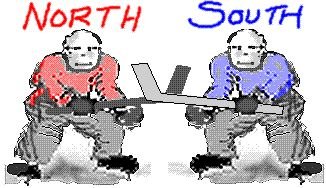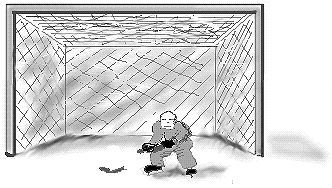Let’s Play Hockey Like We Play Free Trade
Free Trade is, if we must go back to Econ 101, about mobility of three economic factors:
If one or more of these factors is not mobile then Free Trade cannot exist. It's just like hockey: if you take away the hockey sticks, you can still play something, but it sure won't be hockey. But, virtually ALL economists say free trade is a cool idea. That's what we might have to call willfull ignorance because it's hard to accept the idea that none of these economists know about passport restrictions and, while northerners can easily move to the south, southerners cannot freely move to the north. An honest economist would have to say, "But we DON'T HAVE free trade. It's unatainable if labor movement is restricted." No northern economists have. Chakravarthi Raghavan puts it this way: “[about the past damage to poor countries caused by free trade] . . . this important condition [mobility of labor] is normally brushed aside in economic literature by assuming either perfect competition in commodity markets or perfect mobility of labour and capital once administrative barriers to trade are removed.” You see, economists simply assume that all labor is mobile because they have never heard of passports, since, you see, they just DON'T GET OUT that often. It’s an honest mistake! This freedom of workers to move around is fundamental to Interstate Commerce, so revered in the US; they should know about these things. To prohibit a Texan from going to California to seek his fortune in the music industry might seem like a merciful idea but it would be illegal; it's a “restraint of interstate commerce.” Workers in the US and the European Union can go where the work is. That is fundamental to free trade. But in the Global “Free Trade” market they cannot.
Nonetheless, not a day goes by without someone in the British media raving
on about “bogus asylum seekers” and “economic migrants.” Same thing in
the US. So let’s make a change to our Hockey Rule Book. Since the restraints on labor movement penalizes poor countries, let’s let that be reflected in the Rule Book. New Rule #1 Double the size of their goal to make it harder to protect
“If Tony Blair genuinely believes in the boundless opportunities of globalization (Financial Times report August 2nd), he should concentrate his energies ... and begin to dismantle barriers to the cross-border flow of labour. ‘Just Do It’, Mr. Blair.” — Martin Khor, Director, Third World Network
Letter to Financial Times, 11 August 2001 http://www.twnside.org.sg/title/ft.htm “Open trade is not just an economic opportunity, it is a moral imperative. Trade creates jobs for the unemployed. When we negotiate for open markets, we're providing new hope for the world's poor. And when we promote open trade, we are promoting political freedom.” — G. Dubya Bush
Now, what about the free movement of money? That
cause any problems anywhere? Well. actually, yes it does. It was the
free movement of money that caused the Asian crisis. First of all, observe
that while rich countries swamp the poorer countries with “inward investment” money,
poor countries cannot reciprocate and buy into rich countries, because
they are, well... poor. So this is a one-way street. Second of all, the movement of money, 'capital,' is not a requirement of Free Trade. The IMF demands it. The World Bank demands it. But their darling of free trade, Adam Smith, never said it was necessary. As Noam Chomsky tells it, “go back to Adam Smith — the basic principle of free trade is free movement of people. Adam Smith assumed there would not be movement of capital... Now we have exactly the opposite. We have to block movement of people by force, and free up movement of capital. And that’s called free trade.” Paul Kingsnorth Interviews Noam Chomsky,
The Ecologist vol. 32 No. 4, May 2002, p.12 James Tobin: UNESCO Courier,
Interview by Sophie Boukhari, Ethirajan Anbarasan and John Kohut, Feb 1999 p46 “Full convertability [exchanging one money for another, ie. pesos for dollars], however, has proven to be incompatible with exchange rate stability. Once countries lift controls on short-term capial movements and allow full convertability of their currencies, the process of exchange rate determination is privatized as well.” http://www.foreignpolicy-infocus.org/briefs/vol14/v4n17cap.html
Ellen Frank, Emanuel College “Capital Flows and Exchange Rate Policy.” Next, we might note that it is the free movement of money itself that
destabilizes poor countries. The problem is not so much that rich countries
invest in poor countries, but that they get nervous and pull out at the
slightest ripples in the economy, and boom: a crash. So it is the poor
countries who take all the risks when it comes to free movement of money. Let’s go back to that Rule Book. Moving money fast helps rich countries
. . . New Rule #2 Reduce the size of their goal to make it easier to protect and, jeez, give that poor goalie a better stick.
Well, my goodness, that’s a whole lot nicer.
Any other changes today? Sure, here’s just a little one. “Under current immigration policies as practised by developed countries
in Europe and the new world, migrants are accepted from developing
countries if they have money/assets, educational qualifications or
work skills which will make them useful to the host country. Applicants
who possess none of these attributes are rejected. Scientists For Population Reduction
Ahem. http://www.scientists4pr.org/immigration.html New Rule #3 Give that poor goalie some help!
What else can we do for you today? Well we could let the rich countries make promises they have no intention of keeping, just to sort of get the southern countries into the spirit of Free Trade. For instance in "The Ecologist Report" magazine, September 2000, page 36, Walden Bello, Director of Focus on the Global South, wrote “WTO: Serving the Wealthy, Not the Poor.” Dr. Bello is executive Director of Focus on the Global South. http://www.focusweb.org Bello noted that three GATT (pre-WTO days) agreements were approved
in April 1994 at Marrakesh but are now being ignored.
As of 2002, none of these agreements have been implemented. Worse - the subsidies in the north have increased, says Bello, "through ingenious combinations of export subsidies, export credits, market support and various kinds of direct income payments." "... overall subsidization of agriculture in the OECD countries rose from $182 billion in 1995 ... to $362 billion in 1998." To make matters worse the World Bank and have their Structural Adjustment Policies. In this context, some are of particular interest. SAPs include, user fees for essential services like primary health and education or abrupt increases in the price of water in the name of market 'reforms,' more layoffs, less government spending on social programs, less credit for small farmers and small businesses, elimination of subsidies, removal of restrictions on foreign investment, raising of interest rates, devaluation of currencies, deregulation of labor markets, more privatization, pressure to export, slashing of workers' rights and environmental standards, liberalization of trade policies. The north, you see, can increase its subsidies... but clearly the south should show some restraint here. We need a new rule here. New Rule #4 Reduce the size of his stick! It's waaaaaaay too big Now . . .
One question remains: if economists are willing to lie about free trade then where does the doctrine of deceit stop? For a bit more on that topic try: How the Economists Got It Wrong The French Economics Students Revolt: The American Economics Students Revolt: Signatories of the “Kansas City Proposal” will be posted at © copyright 2002 J. Walter Plinge, France |




